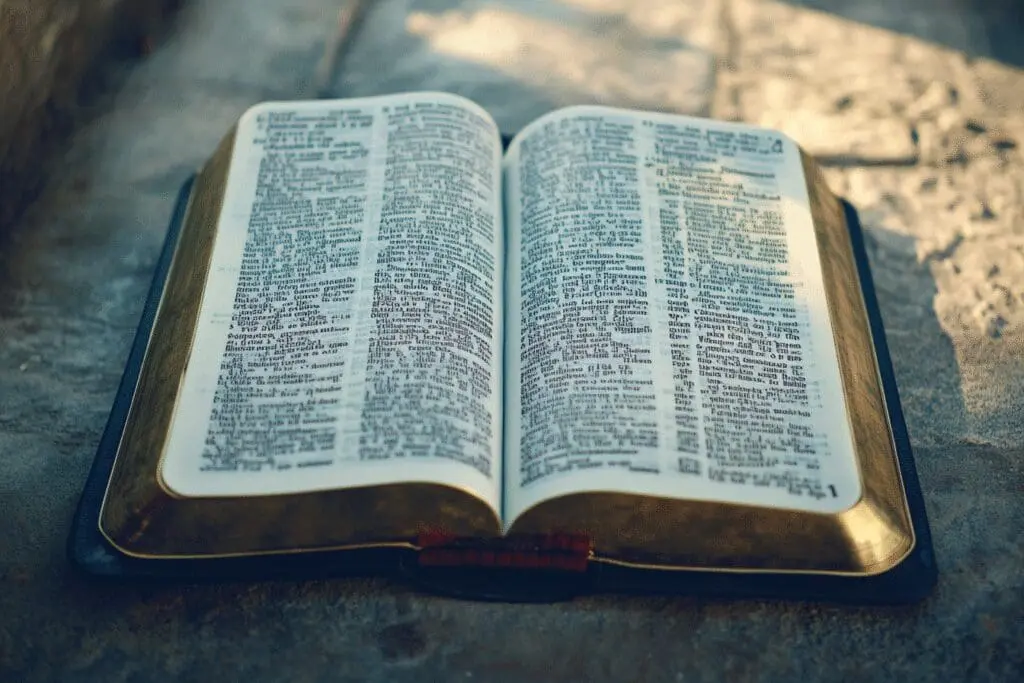I remember the first time I actually tried to read the Bible. Not just the snippets you hear at church or in movies, but really read it. I was maybe twenty-five, full of New Year’s resolution energy, and I thought, “How hard can it be?” I started with Genesis, which was great—all epic stories and drama. But then I hit Leviticus. Suddenly, it was all rules about sacrifices and skin diseases. My grand plan to read the whole thing in a year fizzled out somewhere in the desert with Moses.
My biggest question wasn’t about the rules; it was more fundamental. What even is this book? Is it a history book? A rulebook? A collection of myths? I realized I’d never stopped to ask the most obvious question: What does the Bible say about itself? It felt like a good place to start. Not with what a pastor said, or what a critic said, but with the text itself. It’s a question that cuts through a lot of the noise, and figuring out the answer has been a game-changer for me.
More in Bible Category
Why Is the Book of Nephi Not in the Bible
What Is the Truth About the Bible
What Is the Strongest Evidence That The Bible Is Trustworthy
Key Takeaways
- The Bible claims a divine origin. Passages like 2 Timothy 3:16 say Scripture is “God-breathed,” suggesting its ultimate source is God, not just human authors.
- It’s presented as a unified story. Though written by many authors over centuries, the Bible presents itself as a cohesive narrative pointing toward a central message.
- It’s described as alive and active. According to Hebrews 4:12, the Bible isn’t just a static, ancient text but something that can actively work in a person’s life today.
- Its purpose is practical. The text claims to be useful for teaching, correcting, and training in righteousness, aiming to equip people for a better life.
- Human authors were essential. While claiming divine inspiration, the Bible doesn’t erase the personalities, styles, and contexts of its human writers.
So, Where Does the Bible Claim Its Authority Comes From?
This was the big one for me. Is this book just the collection of wise thoughts from ancient guys, or does it claim to be something more? If it’s just human advice, I can take it or leave it, like a fortune cookie. But if it claims to be from God, well, that’s a different league entirely.
I stumbled upon a verse that everyone seems to point to, and for good reason. It’s in a letter from an early church leader named Paul to his protégé, Timothy.
“All Scripture is God-breathed and is useful for teaching, rebuking, correcting and training in righteousness, so that the servant of God may be thoroughly equipped for every good work.” (2 Timothy 3:16-17, NIV)
That phrase “God-breathed” (the Greek word is theopneustos) stopped me in my tracks. It’s not saying God dictated every word like a CEO dictating a memo. It’s more intimate, like the way a creator breathes life into their creation. The words on the page, according to Paul, have a divine life to them. They aren’t just human words about God; they are, in a sense, God’s words transmitted through humans.
This idea felt both huge and hard to grasp. It positioned the Bible not as a product of human genius, but of a partnership between God and people.
But Did the Human Authors Know They Were Being ‘Breathed On’?
This was my follow-up question. Did the prophet Isaiah or the fisherman-turned-disciple Peter think they were writing a holy book for the ages? Another passage, this time from Peter himself, shed some light on it.
He wrote:
- Above all, you must understand that no prophecy of Scripture came about by the prophet’s own interpretation of things.
- For prophecy never had its origin in the human will, but prophets, though human, spoke from God as they were carried along by the Holy Spirit. (2 Peter 1:20-21, NIV)
The image of being “carried along” by the Spirit really clicked for me. It’s like a ship with its sails up. The ship is real, the sails are real, and the captain is steering. But it’s the wind—an external, powerful force—that provides the movement and direction. The writers weren’t mindless robots; they were active participants. They used their own language, their own personalities, their own historical settings. Yet, the driving force behind their message, Peter claims, was God himself.
Is It Just One Big Book or a Bunch of Different Ones?
I used to think of the Bible as a single book. But it’s not; it’s a library. There are 66 different books written by around 40 different authors over something like 1,500 years. There’s history, poetry, prophecy, letters, and wisdom literature. It’s a wild collection.
So how can anyone claim it’s one cohesive thing?
The answer, I think, lies in how the later parts of the Bible talk about the earlier parts. The New Testament is constantly quoting the Old Testament. The writers saw their work not as starting something new, but as continuing and fulfilling what came before.
Jesus himself says this in what’s known as the Sermon on the Mount:
“Do not think that I have come to abolish the Law or the Prophets; I have not come to abolish them but to fulfill them.” (Matthew 5:17, NIV)
He’s talking about the entire Old Testament there (“the Law or the Prophets”). He saw his own life and teachings as the climax of the story that had been unfolding for centuries. It’s like the final season of a long-running TV show—it doesn’t erase the earlier seasons; it makes sense of them. This suggests the Bible sees itself as having a single, overarching plotline, even with all its diverse authors and genres.
What’s the Point of It All, According to the Bible?
Okay, so it claims to be God-breathed and part of a unified story. But what is it for? Is it just to give us information about God? That 2 Timothy passage gives a pretty clear answer: it’s for practical application.
Let’s look at it again:
- For teaching: It’s meant to show us what’s true about God, ourselves, and the world.
- For rebuking: It points out where we’ve gone wrong. This isn’t always comfortable, but it’s necessary, like a doctor telling you to stop eating so much junk food.
- For correcting: It doesn’t just point out the problem; it shows the way back to the right path.
- For training in righteousness: It’s like a workout plan for your character, helping you build spiritual muscle.
The end goal? To make a person “thoroughly equipped for every good work.” It’s not about winning trivia night; it’s about changing how you live, how you treat people, and who you become. The Bible claims its own purpose is transformation, not just information.
Is This Book Supposed to Be ‘Alive’?
One of the strangest and most compelling things the Bible says about itself is found in the book of Hebrews.
“For the word of God is alive and active. Sharper than any double-edged sword, it penetrates even to dividing soul and spirit, joints and marrow; it judges the thoughts and attitudes of the heart.” (Hebrews 4:12, NIV)
“Alive and active.” That’s so different from how we usually think about ancient texts. I think of old books as dusty artifacts under glass in a museum. This verse claims the opposite. It says that when you engage with the words of the Bible, something engages back.
I’ve felt this. There have been times I’ve been reading a passage—maybe something from the Psalms or a story about Jesus—and it felt like it was reading me. A verse would cut through all my excuses and justifications and expose a fear or a selfish motive I didn’t even want to admit to myself. It’s an uncomfortable but clarifying experience. It’s what makes me think there might be something to this “alive and active” idea. The book isn’t just a relic; it’s a tool, a mirror, a scalpel.
How Should We Approach Reading It, Then?
If all this is true, it changes how you come to the book. You can’t just read it like a novel or a textbook. The Bible seems to suggest it requires a different kind of posture. One of the longest chapters in the entire Bible, Psalm 119, is basically a 176-verse poem about how amazing and life-giving God’s Word is.
The psalmist writes things like:
- “I have hidden your word in my heart that I might not sin against you.” (v. 11)
- “Your word is a lamp for my feet, a light on my path.” (v. 105)
- “Direct my footsteps according to your word; let no sin rule over me.” (v. 133)
This isn’t someone speed-reading to check a box. This is someone meditating on the text, memorizing it, and trying to build their life around it. It’s treated as a guide, a protector, and a source of light in dark places. It’s a relationship, not just research. For more on how the collection of books came to be seen as authoritative scripture, the history of the biblical canon is a fascinating topic. Resources from academic institutions like Duke Divinity School offer a great deep dive into this process.
So, What’s the Takeaway for a Skeptic Like Me?
Looking back, my initial failure to read the Bible came from a wrong assumption. I was treating it like any other book, something to be conquered and consumed. But if the Bible’s own claims are to be believed, it’s a book that is meant to read you.
It claims to be a divinely inspired, unified, and living text designed to transform you from the inside out. That’s a massive claim. And it’s one you can’t really verify from a distance. The only way to test if a lamp works is to switch it on in a dark room. The only way to know if a sword is sharp is to see what it can cut.
For me, the journey isn’t over. There are still parts of the Bible that are confusing, parts that are challenging, and parts that I just don’t understand yet. But starting with what the book claims about itself has given me a new framework. I’m no longer just reading the words of ancient men. I’m engaging with a text that claims to be alive, a text that invites me to test its power in the real world. And that’s a resolution worth sticking with.
Frequently Asked Questions – What Does the Bible Say About Itself

How does the Bible describe its power and influence?
The Bible describes itself as living and active, sharper than any two-edged sword, able to pierce deep into the soul and spirit, discerning thoughts and motives. This highlights its powerful and transformative nature, capable of revealing truth and shaping lives.
What does the Bible say about its prophetic authority?
The Bible says its prophetic words are more fully confirmed and guides believers like a lamp in darkness. It states that prophecy does not come from human interpretation but from men speaking from God, carried along by the Holy Spirit, ensuring its divine authority and reliability.
What is the purpose of Scripture according to 2 Timothy?
According to 2 Timothy, the purpose of Scripture is to teach, reprove, correct, and train in righteousness so that believers may be complete and equipped for every good work. Its main goal is to bring about internal change in individuals, guiding them to live lives that please God.
How can the Bible be from God but written by humans?
The Bible was written by human writers who had their own styles and backgrounds, like Luke, a doctor, and David, a king. Despite their different voices, God worked through these real people, guiding their writings so that God’s message was perfectly conveyed in their unique ways, much like a musician playing the same song on different instruments.
What does the Bible say about its divine origin?
The Bible states that it is ‘breathed out by God’ through the Apostle Paul, indicating it is a message from God, not just human ideas. This is expressed with the Greek word ‘Theopneustos,’ which combines ‘God’ and ‘to breathe,’ emphasizing that the writings are a product of God’s own breath.




